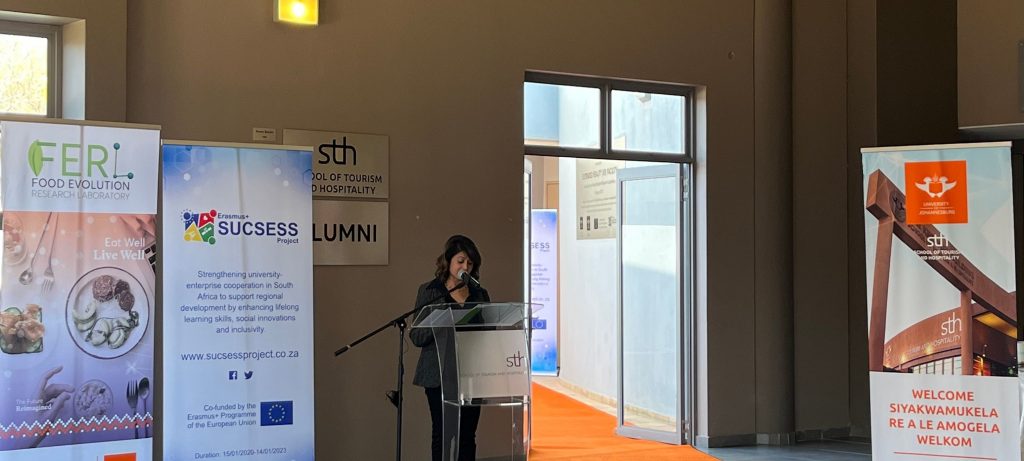|
News 2022-08-31 UJ’s School of Tourism and Hospitality launch Extended Reality Lab (XR Lab The University of Johannesburg’s (UJ) School of Tourism and Hospitality (STH) launched an Extended Reality (XR) Lab on Thursday, 25 August 2022. The XR facility is established through the Food Evolution Research Laboratory (FERL), a virtual research laboratory located within STH, in collaboration with the Metaverse Research Unit at UJ. FERL has a specific focus on the evolution of food and conducting research to enhance the lifestyles of people in communities who recognise the importance of health and nutrition. Extended Reality is a combination of Virtual Reality (VR) and Augmented Reality (AR). “XR Technology allows immersion in the evolving three-dimensional environments which provides innovative research and instils education. Research becomes innovative by using XR as a tool for data collection through observations in the lab. The use of 360-degree camera footage taken from various research settings can be shared with a larger audience through XR thus bringing the real world to the virtual classroom/lab. This type of learning could be interesting and fun for both students and researchers,” – Dr Hema Kesa, FERL Director. FERL will be adopting these technologies for research, training as well as teaching and learning purposes.
Examples of implementation:
Students will be taught a concept in the classroom and this will be demonstrated and assessed through the use of XR, eg. Nutrition Education, Portion control, Healthy eating choices vs unhealthy food choices all linked to Food Away from Home (FAFH). Students will be exposed to different food environments and their choices can be assessed.
FERL will use XR as a tool for data collection. This will be done by creating various Food and Nutrition environments where participants will be trained and behaviours will be observed in the XR lab. FERL’s current VR research projects are:
The study involves:
A virtual reality buffet will be developed and customised for this research endeavour. Virtual foods will include both healthy and unhealthy options, with participants filling their plates with options they would generally eat. This will then be recorded and assessed.
A virtual grocery store will be created, allowing the participants to shop for a week’s worth of food on a limited budget. Time spent looking at specific food items as well as the type of groceries chosen will be recorded. This study has a strong focus on technology, multidisciplinary and international collaboration. This will also serve as a means of community nutrition awareness which may also enlighten the people in the selected community about the benefit of consuming healthy foods.
This project aims at identifying IFs that could be of interest in the fight against food insecurity and malnutrition with the help of VR technology. This will also help to promote the consumption of IFs. The XR Lab is established through funding support from the SUCSESS Project – an Erasmus+ Funded initiative. The SUCSESS project focuses on strengthening the cooperation between higher education institutions and industry partners in South Africa to improve graduate employability. FERLs XR projects have also been funded externally and by UJ’s GES and URC funds. |





